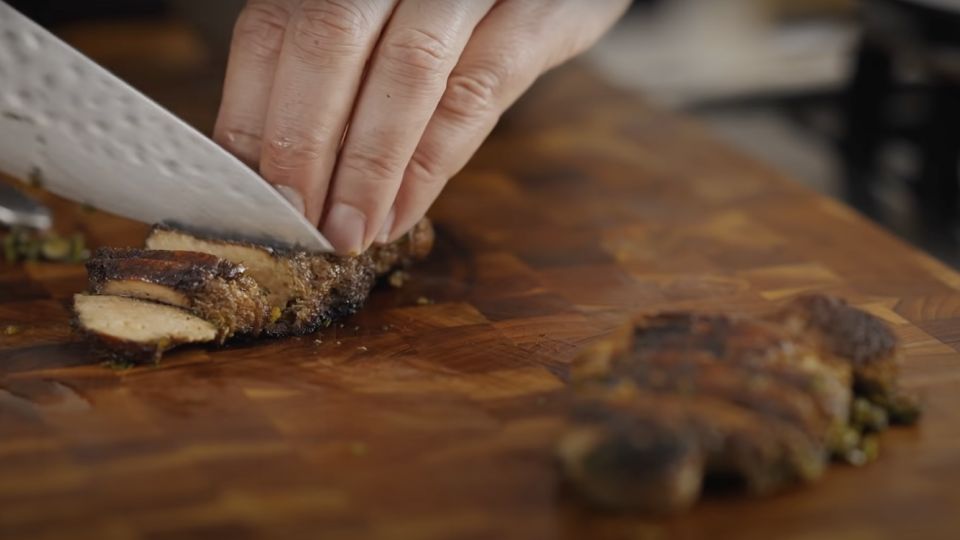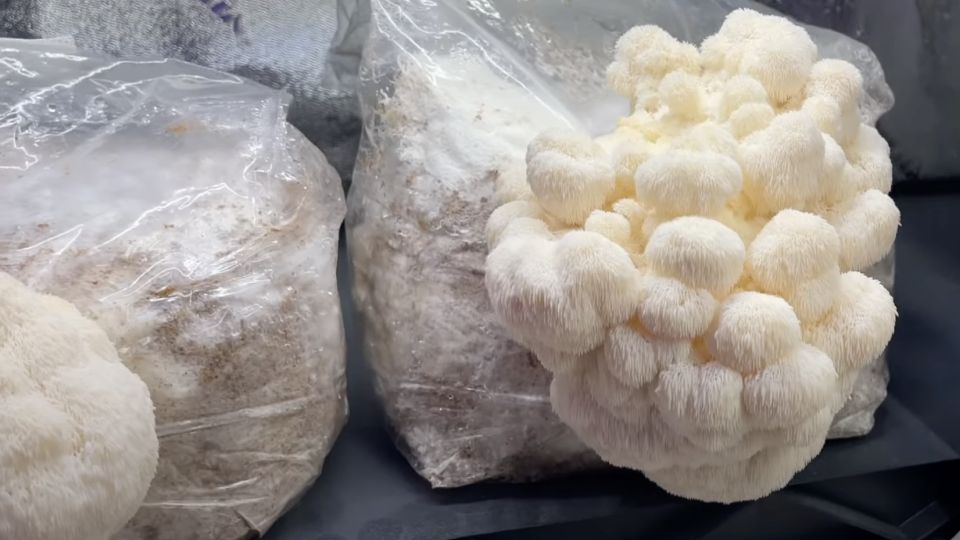Exploring the Exquisite Taste of Lion’s Mane Mushroom
Many people know about the benefits of functional mushrooms like Lion’s Mane but wonder if they’ll enjoy the flavor. If you’re not a fan of the typical earthy taste of mushrooms, you might be pleasantly surprised by Lion’s Mane’s unique flavor. Additionally, It comes in various forms like tinctures, powders, and gummies, making it versatile for consumption.
So, what does Lion’s Mane mushroom taste like? Can you eat it raw? Let’s explore the flavor of Lion’s Mane in this guide to help you decide how to incorporate this incredible mushroom into your diet.
In this article:
What is Lion’s Mane Mushroom?
The Lion’s Mane Mushroom has emerged as a darling in the culinary world, captivating the taste buds of food enthusiasts and health-conscious individuals alike. Distinguishing itself from ordinary mushrooms, Lion’s Mane falls into the category of functional mushrooms, prized for the health benefits they offer beyond just nutritional value[1].
Lion’s Mane, scientifically known as Hericium erinaceus, is an edible mushroom that thrives on hardwood trees during late summer and fall. It has a rich history in Asian herbal medicine, where it’s been cherished for centuries for its potential to enhance brain function[2].
On the other hand, many individuals are discovering the diverse culinary possibilities of Lion’s Mane, incorporating it into recipes and creative dishes to harness its numerous benefits. Modern research validates its ability to support a healthy mood, maintain a balanced immune system, and enhance cognitive performance.
What Does Lion’s Mane Mushroom Taste Like?

A Delightful Surprise
Lion’s Mane Mushroom is often described as a culinary gem due to its extraordinary taste. When you take your first bite, you’ll notice a mild, sweet flavor with earthy overtones that tantalize your palate. This unique combination of flavors sets it apart from other mushrooms, making it a sought-after ingredient in various cuisines.
Seafood-Like Sensation
One intriguing aspect of Lion’s Mane Mushroom’s taste is its resemblance to seafood, particularly crab or lobster. This has earned it the nickname “the crab of the woods.” The mushroom’s texture, when cooked, becomes tender and juicy, further enhancing its similarity to crab meat.
Culinary Versatility
The versatility of Lion’s Mane Mushroom in the kitchen is truly remarkable. You can use it to create delectable dishes like vegan crab cakes, where the mushroom’s taste and texture mimic the real thing. Additionally, it pairs wonderfully with pasta dishes, adding a unique twist to your favorite recipes.
Do Fresh and Dried Lion’s Mane Taste the Same?
One common question that arises when exploring Lion’s Mane Mushroom is whether the taste remains consistent between fresh and dried forms. While both varieties retain the mushroom’s signature sweet and earthy flavors, there are some subtle differences to consider.
Fresh Lion’s Mane Mushroom offers a slightly more pronounced sweetness and a juicier texture, making it an ideal choice for dishes where its unique taste can shine. However, the story takes an interesting twist with dried Lion’s Mane.
When Lion’s Mane mushrooms undergo the drying process, their flavor becomes more concentrated and takes on a rich, umami quality. Notably, dried Lion’s Mane can be easily rehydrated with water, restoring its texture and making it a versatile substitute for fresh mushrooms.
Alternatively, you can transform dried Lion’s Mane into a powder, unlocking its potential for a range of culinary adventures. This powder can be incorporated into soups, stews, smoothies, juices, and even teas. For the adventurous, it can even be added to coffee, allowing you to savor the unique essence of Lion’s Mane in various culinary creations.
Can You Eat Lion’s Mane Raw?
Lion’s Mane Mushroom is indeed edible in its raw form, but it’s worth noting that cooking it enhances its flavor and texture significantly. When consumed raw, the taste is somewhat bland, and the texture is less appealing. To truly savor the delightful taste of Lion’s Mane Mushroom, it’s recommended to incorporate it into various cooked dishes.
The Raw Lion’s Mane Mushroom Taste Test
To satisfy my curiosity, I embarked on a taste test adventure with raw Lion’s Mane mushrooms. The raw Lion’s Mane mushroom surprised me. Unlike the raw button mushrooms I’d tasted before, Lion’s Mane had a milder, almost nutty flavor with a delicate hint of sweetness. The texture was less rubbery and more reminiscent of a crisp, slightly firm texture, akin to fresh vegetables.
While I can’t say I’ve become an avid fan of raw mushrooms, my experience with raw Lion’s Mane was more pleasant than expected. It’s important to note that the taste and texture of raw mushrooms can vary depending on factors like freshness and individual preference. If you’re open to culinary experimentation, trying raw Lion’s Mane could be an interesting adventure.
How to Grow Lion’s Mane Mushrooms

If you want to cultivate Lion’s Mane Mushrooms at home, it’s entirely possible to do so. These fungi are typically grown on hardwood trees, and with the right conditions and a bit of patience, you can enjoy a fresh supply of this delectable mushroom in your own backyard.
Here’s a simple guide to help you get started:
- Order a Grow Kit: Find a reputable supplier nearby with excellent reviews and order a Lion’s Mane mushroom grow kit.
- Placement: Place the grow kit on your kitchen counter and make sure to lightly spray it with water at least once a day.
- Harvesting: When you notice the mushrooms growing and their tendrils pointing downward, it’s time to harvest them. Simply twist them at the base and pull them off. Store your harvested Lion’s Mane mushrooms in a paper bag in your vegetable drawer.
- Multiple Harvests: You can expect around five harvests from the same kit before it’s time to compost it.
If growing them at home seems like too much work, you can also explore the option of purchasing Lion’s Mane supplements from trustworthy online stores. This way, you can enjoy the benefits of this functional mushroom in a concentrated form without the hassle.
How to Clean and Store Lion’s Mane
Properly cleaning and storing Lion’s Mane Mushroom is essential to preserve its taste and texture. To clean, gently brush off any dirt or debris using a soft brush or a paper towel. Avoid using water, as the mushroom is absorbent and can become soggy.
To store Lion’s Mane Mushroom, place it in a paper bag and refrigerate. This helps maintain its freshness for an extended period. When you’re ready to use it, simply remove it from the bag and proceed with your chosen recipe.
How to Cook Lion’s Mane Mushroom

Cooking Lion’s Mane mushrooms is a breeze, and the key to savoring their delicate flavor and texture is simplicity. Here’s a straightforward way for you to enjoy them:
- Heat some butter or oil in a pan over medium heat.
- Toss the mushroom slices in the pan.
- Season them to your liking; a pinch of salt, pepper, and garlic should work well.
- Sauté the mushrooms for about 5 minutes until they slightly shrink and turn a lovely golden brown.
- Remember not to overcook them, as this can make them excessively chewy. So, once that golden color is achieved, take them off the heat.
To discover additional recipes, simply visit our Lion’s Mane mushroom recipe blog.
Lion’s Mane Medical Compounds
Beyond its exceptional taste, Lion’s Mane Mushroom boasts a treasure trove of potential health benefits[3]. This mushroom has been a subject of scientific research, and its medicinal properties have been gaining recognition in recent years.
| Compound | Medical Benefits |
| Erinacines | Stimulate nerve growth, potential neuroprotection |
| Hericenones | Enhance cognitive function, potential anti-inflammatory properties |
| Beta-Glucans | Boost immune system, potential anticancer effects |
| Polysaccharides | Support overall health, potential antioxidant properties |
| Antioxidants | Neutralize free radicals, potential anti-aging benefits |
| Anti-Inflammatory | Reduce inflammation, potential pain relief |
Health Benefits of Lion’s Mane Mushroom
Now that you’re familiar with Lion’s Mane mushroom components, let’s explore how Hericium erinaceus can benefit your overall health and well-being. Here are some of its advantageous effects:
- Cognitive enhancement
- Improve memory
- Nerve growth stimulation
- Immune system support
- Improves digestive health
- Potential neuroprotection
- Help with reducing depression and anxiety
- Anti-inflammatory effects
- Lowers blood sugar levels
- Antioxidant properties
- Potential anticancer properties
- Pain relief
- Anti-aging potential
- Reduces symptoms of depression and anxiety
- Aids in weight loss and weight maintenance
FAQs
Does Lion’s mane make you sleepy?
No, Lion’s Mane mushroom is not known to make you sleepy. In fact, it’s often consumed for its potential to enhance cognitive function and focus, making it a popular choice for those seeking mental clarity and alertness.
Does Lion’s mane make you high?
No, Lion’s Mane does not make you high. It lacks psychoactive compounds like those found in certain other mushrooms. Instead, Lion’s Mane is valued for its potential health benefits, particularly for brain function and overall well-being. It’s a safe and non-intoxicating mushroom.
Can I make mushroom tea from Lion’s mane?
Yes, you can make mushroom tea from Lion’s Mane. Simply steep dried or fresh Lion’s Mane slices in hot water, just like brewing regular tea. This allows you to enjoy the unique flavor and potential health benefits of Lion’s Mane in a soothing and delicious beverage.
Does Lion’s mane taste like lobster?
Lion’s Mane is often described as having a taste similar to lobster or crab. Its unique flavor profile makes it a popular choice for those seeking a seafood-like experience in their dishes, making it a delightful addition to various recipes.
Does Lion’s mane taste bitter?
Lion’s Mane does not taste bitter. Its flavor is more delicate and often likened to seafood, with a hint of sweetness. Many people find it quite pleasant and not bitter at all, making it a versatile and enjoyable ingredient in various culinary creations.
How does Lion’s mane make you feel?
Lion’s Mane is known for its potential to enhance cognitive function, mood, and overall well-being. It can make you feel more alert, focused, and calm. Many users report positive effects on mental clarity and a sense of improved mental sharpness when incorporating Lion’s Mane into their routines.
Summary: What Does Lion’s Mane Mushroom Taste Like?
Lion’s Mane Mushroom is a culinary gem that not only piques the taste buds but also offers a unique seafood-inspired flavor and satisfying texture. My personal journey with this mushroom has solidified my admiration for its taste and versatility in cooking.
Furthermore, incorporating Lion’s Mane extract powder into my daily routine has provided an extra layer of health benefits, enhancing my overall well-being. Whether you’re a culinary explorer or someone seeking natural health boosts, Lion’s Mane Mushroom is a remarkable addition to consider. Its distinctive flavor, combined with potential health advantages, makes it an enticing choice for both the kitchen and the pursuit of well-rounded health.
References
1. Therapeutic Potential of Hericium erinaceus for Depressive Disorder. Retrieved from https://www.ncbi.nlm.nih.gov/pmc/articles/PMC6982118/
2. Improving effects of the mushroom Yamabushitake (Hericium erinaceus) on mild cognitive impairment: a double-blind placebo-controlled clinical trial. Retrieved from https://onlinelibrary.wiley.com/doi/abs/10.1002/ptr.2634
3. Neurohealth Properties of Hericium erinaceus Mycelia Enriched with Erinacines. Retrieved from https://www.ncbi.nlm.nih.gov/pmc/articles/PMC5987239/

